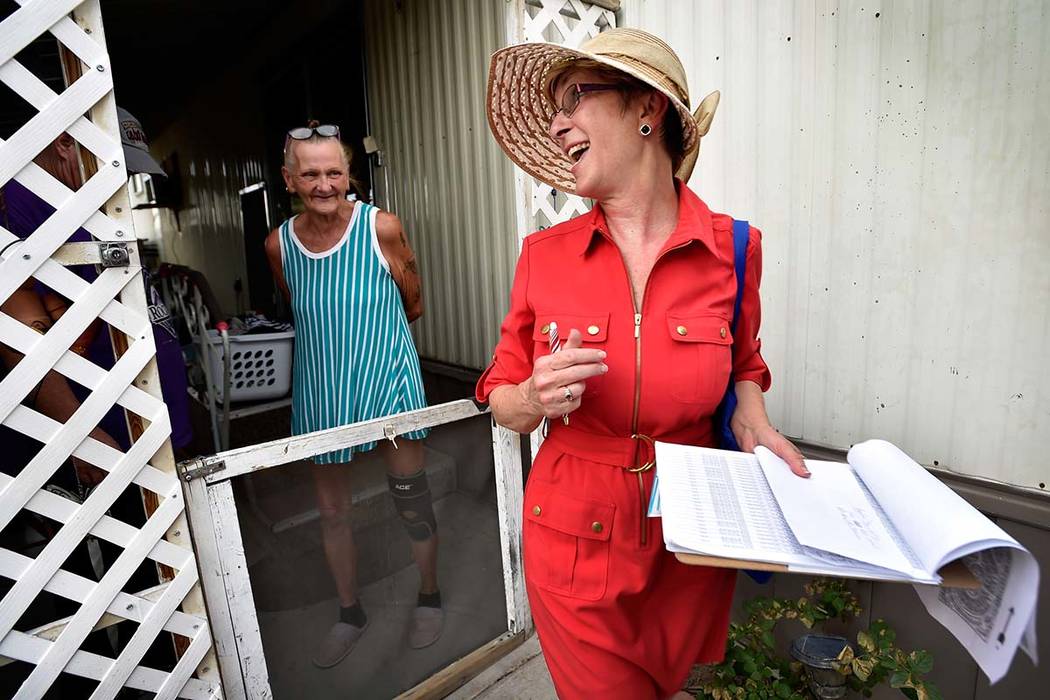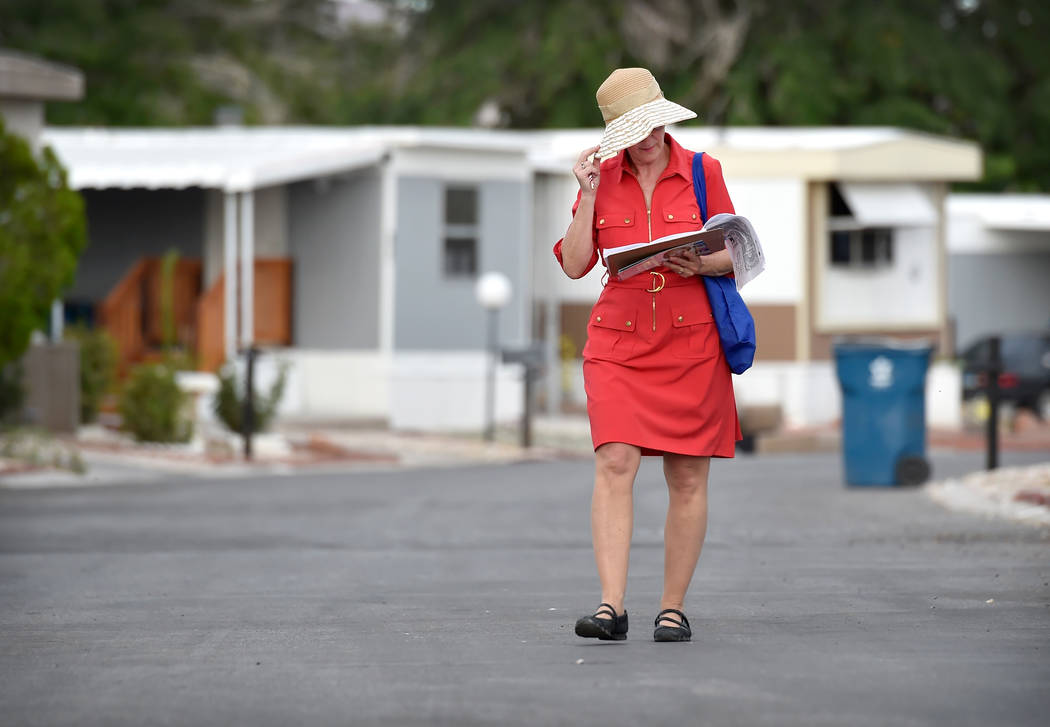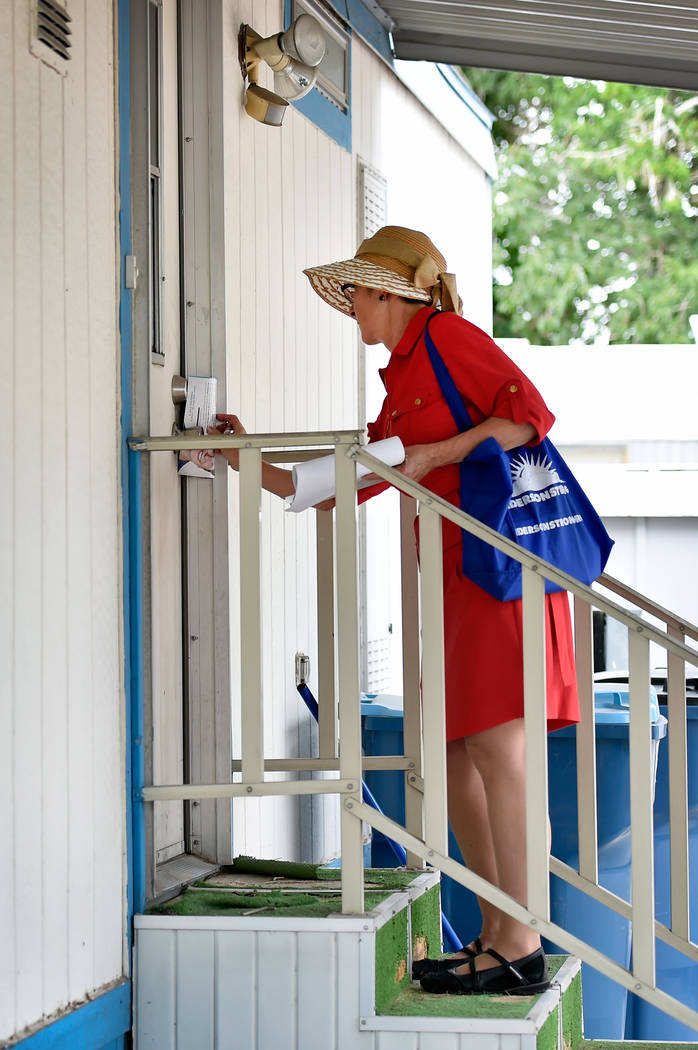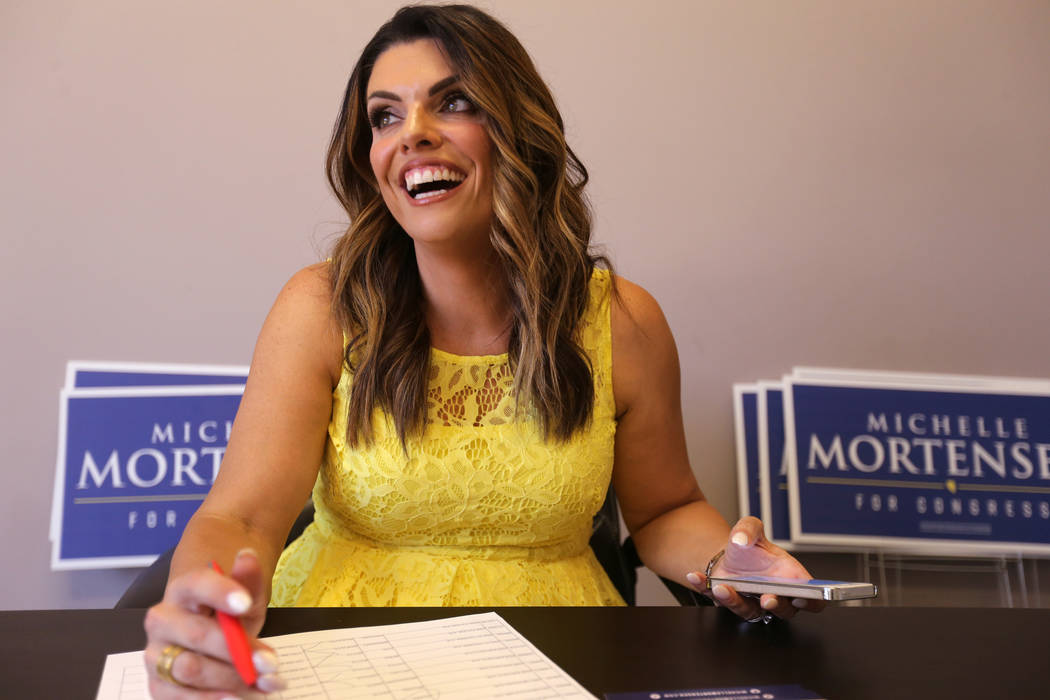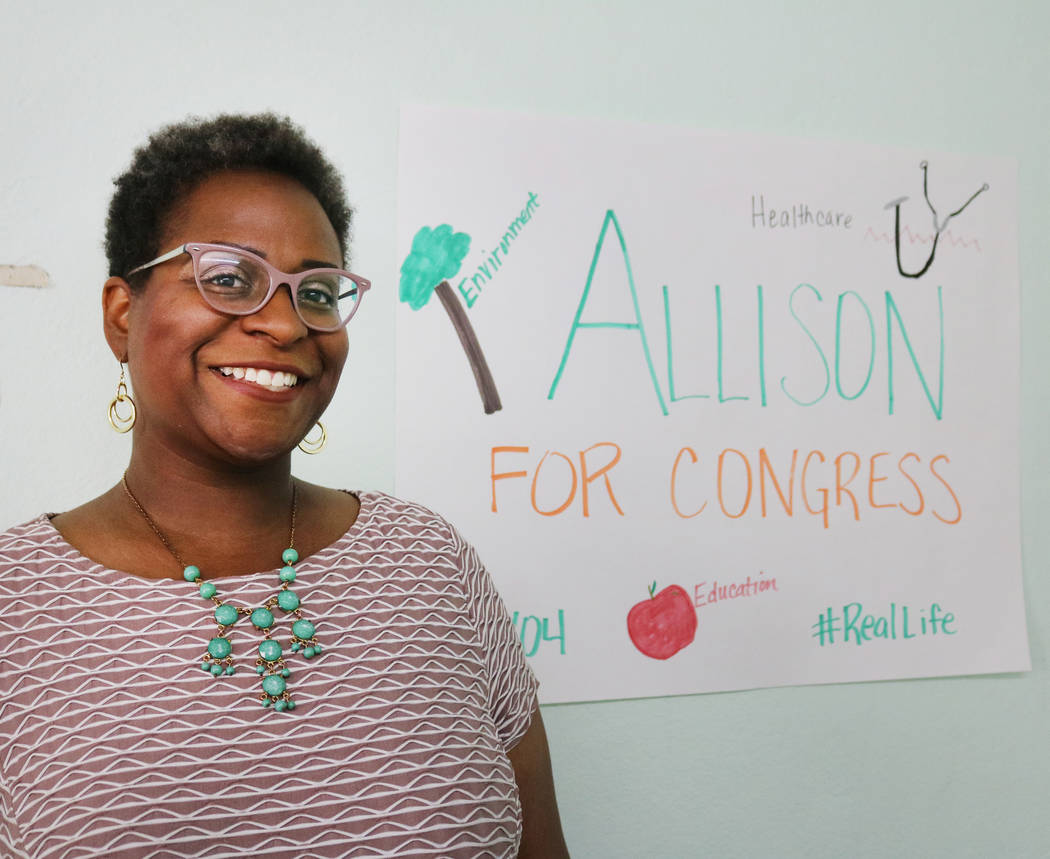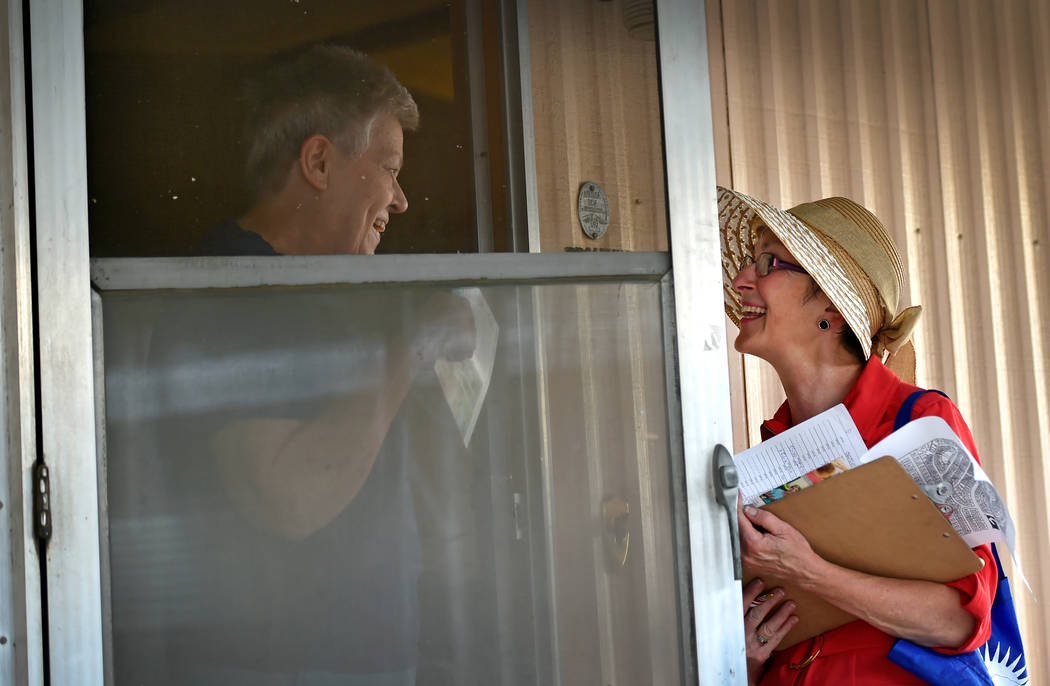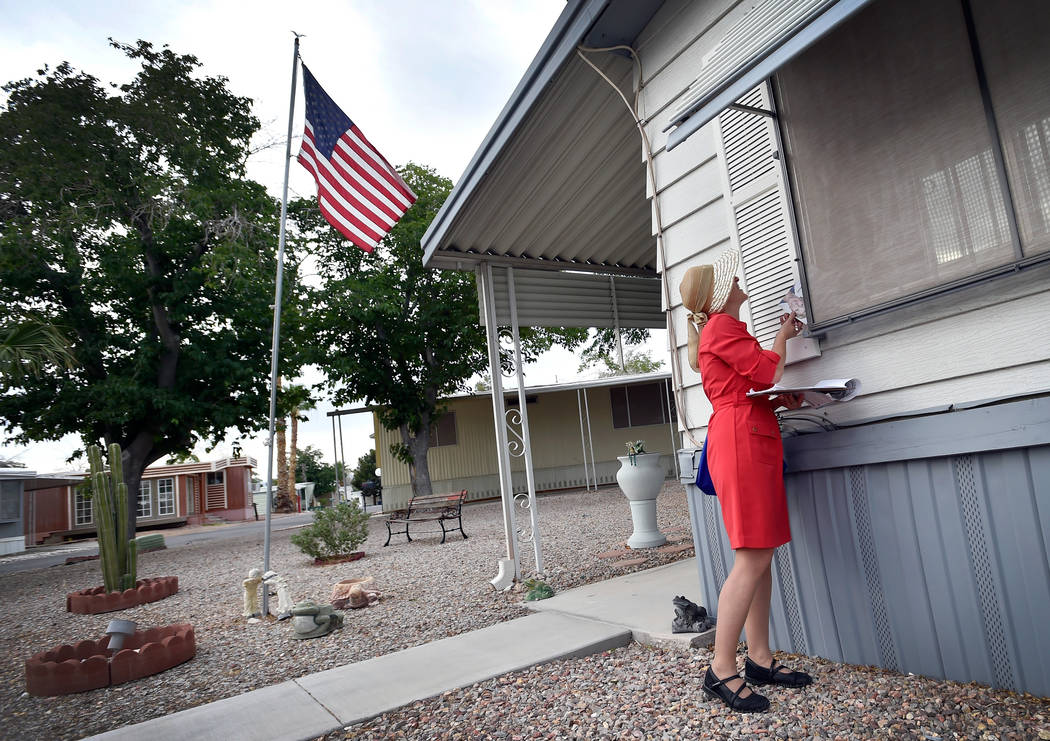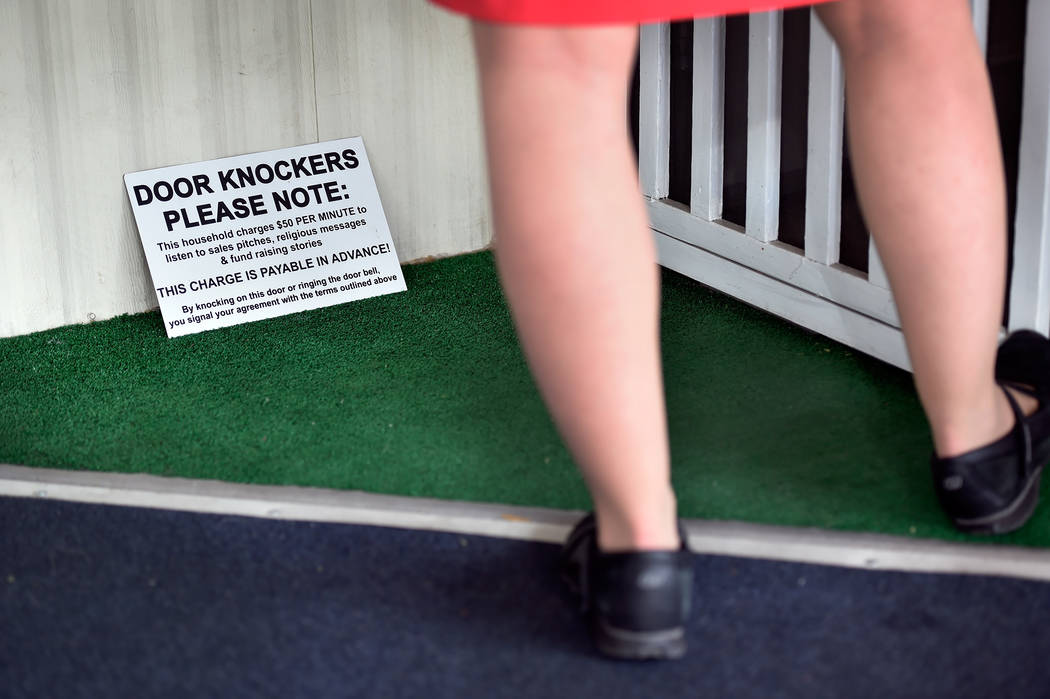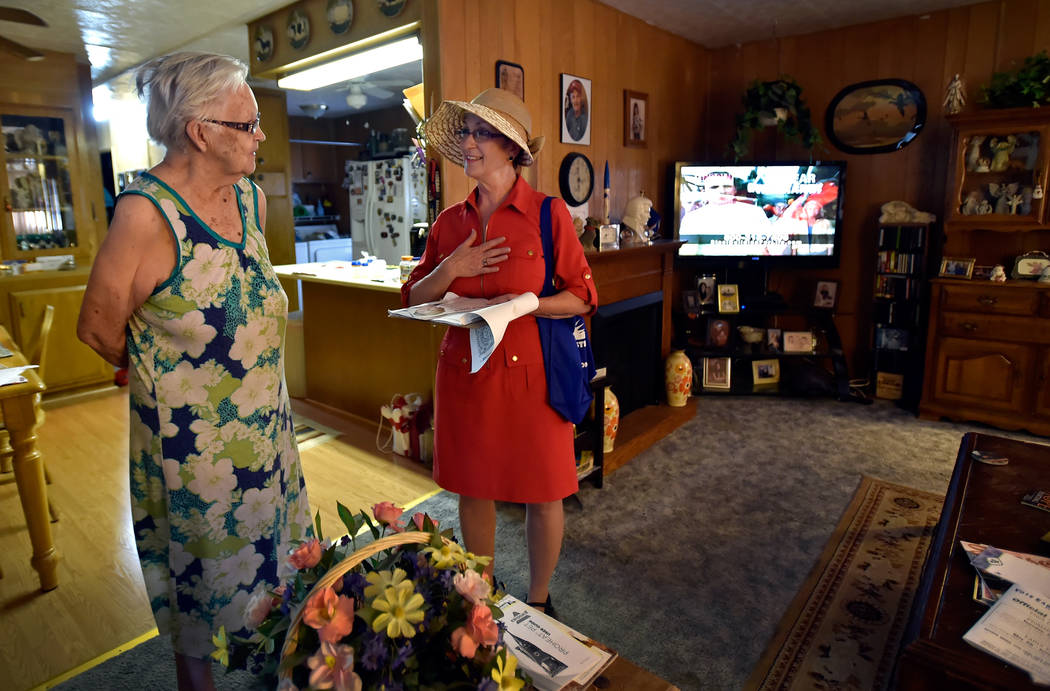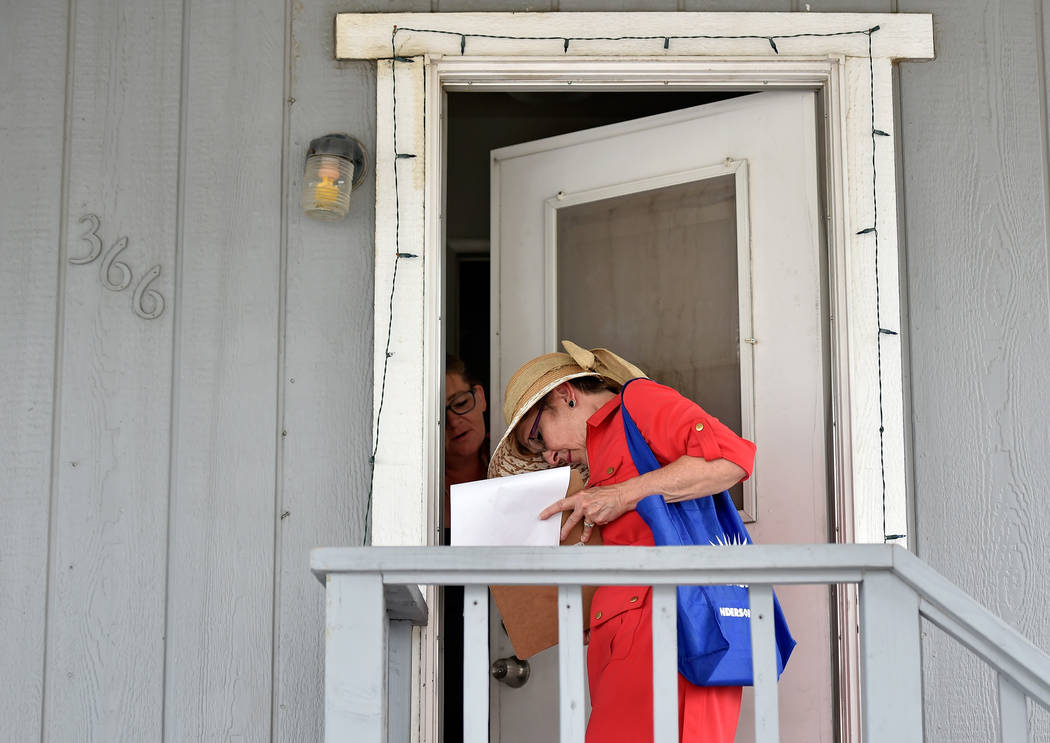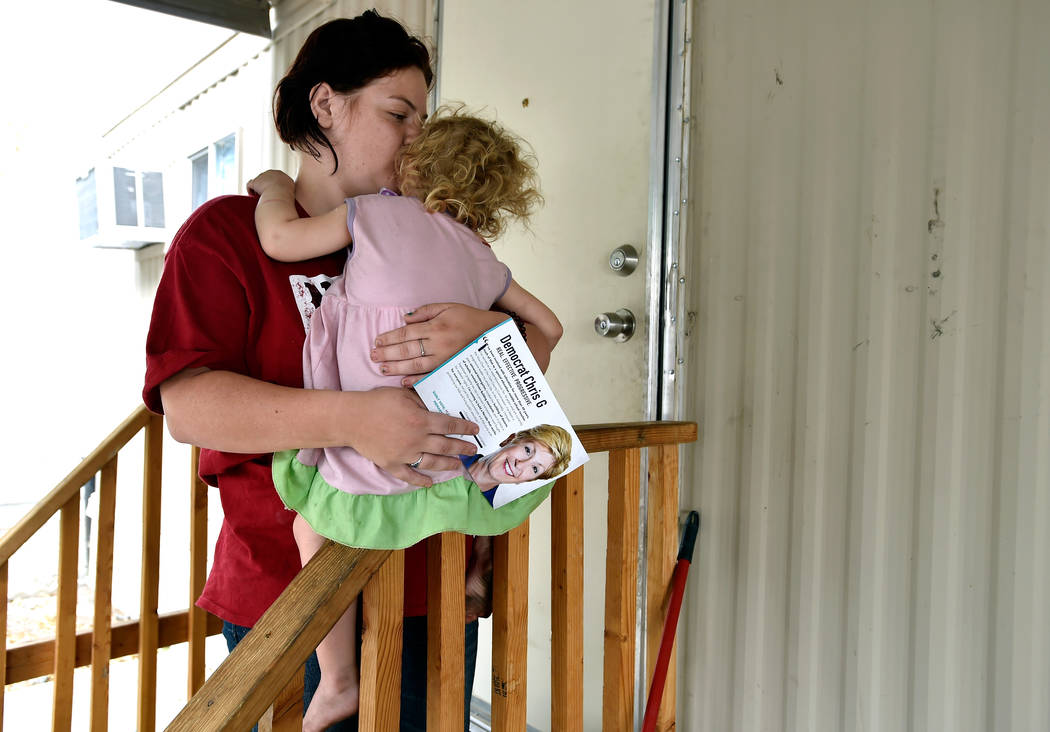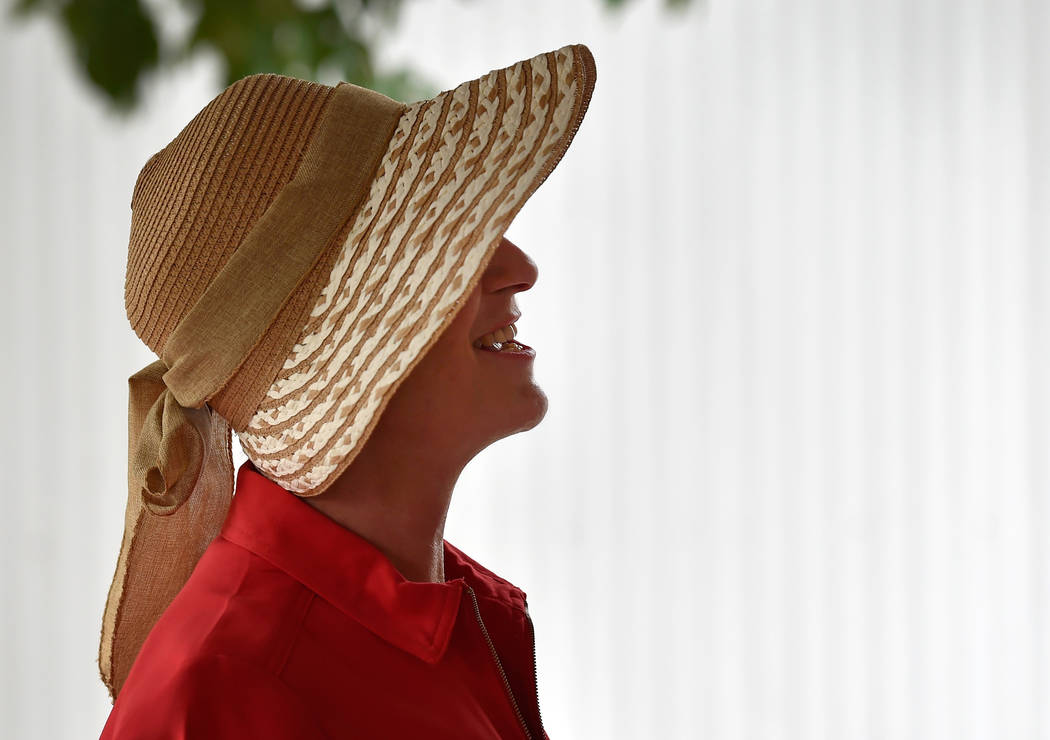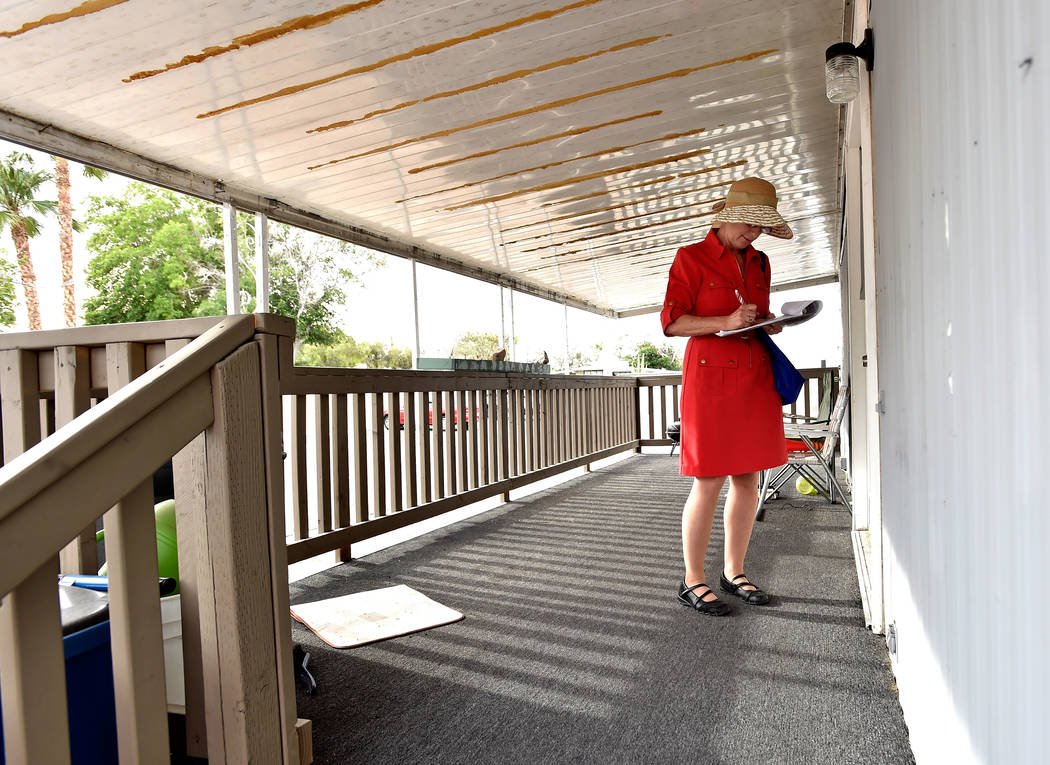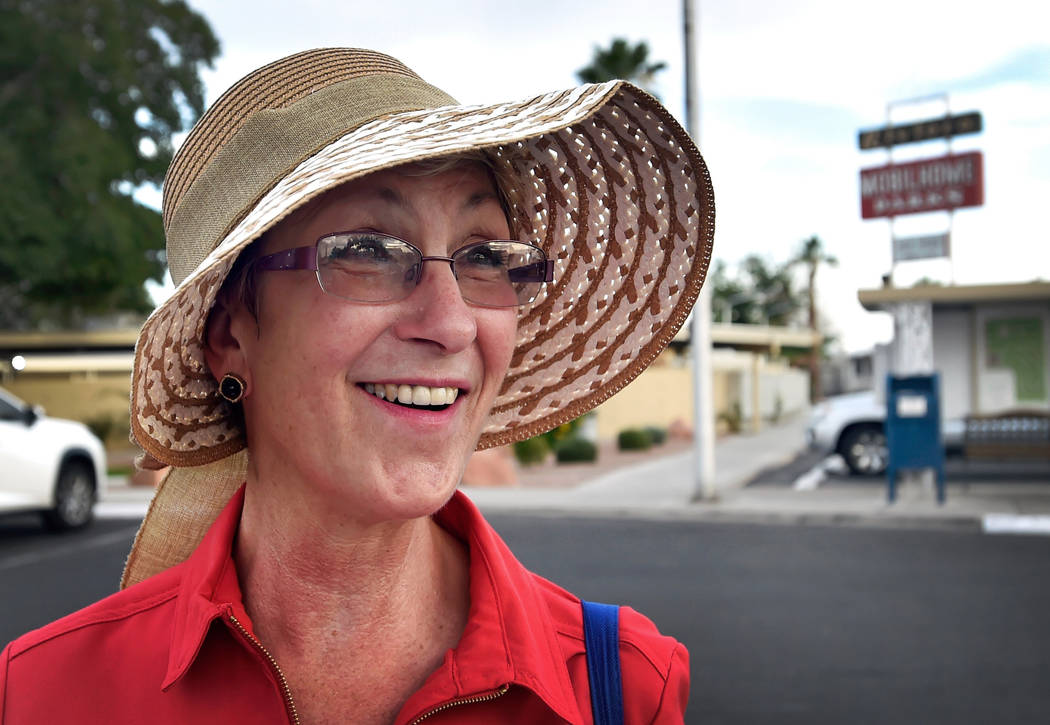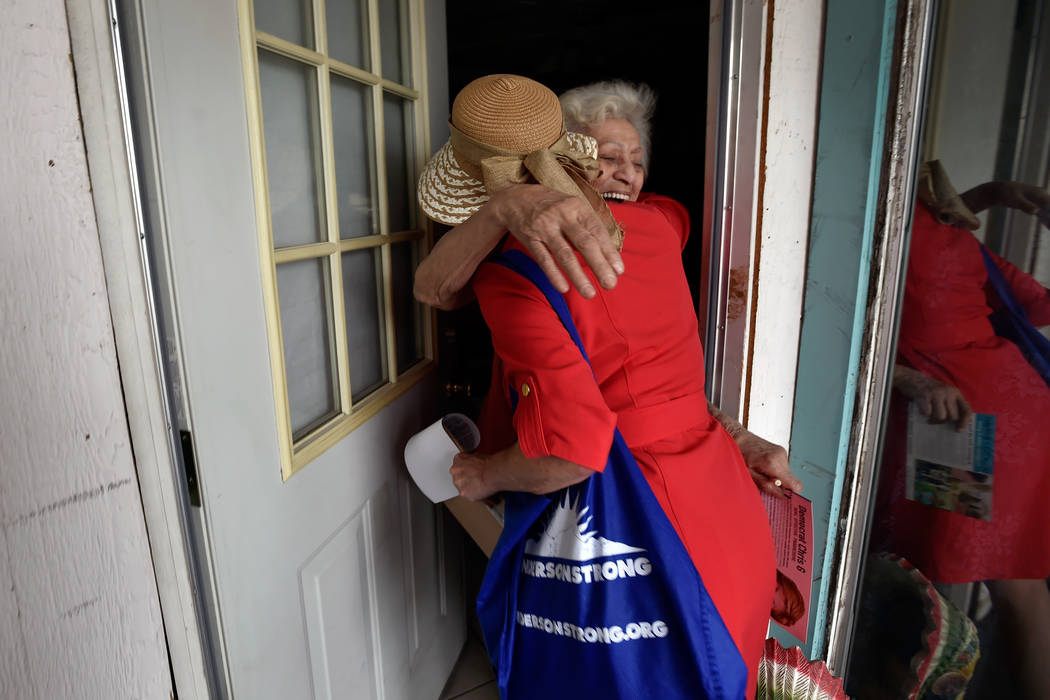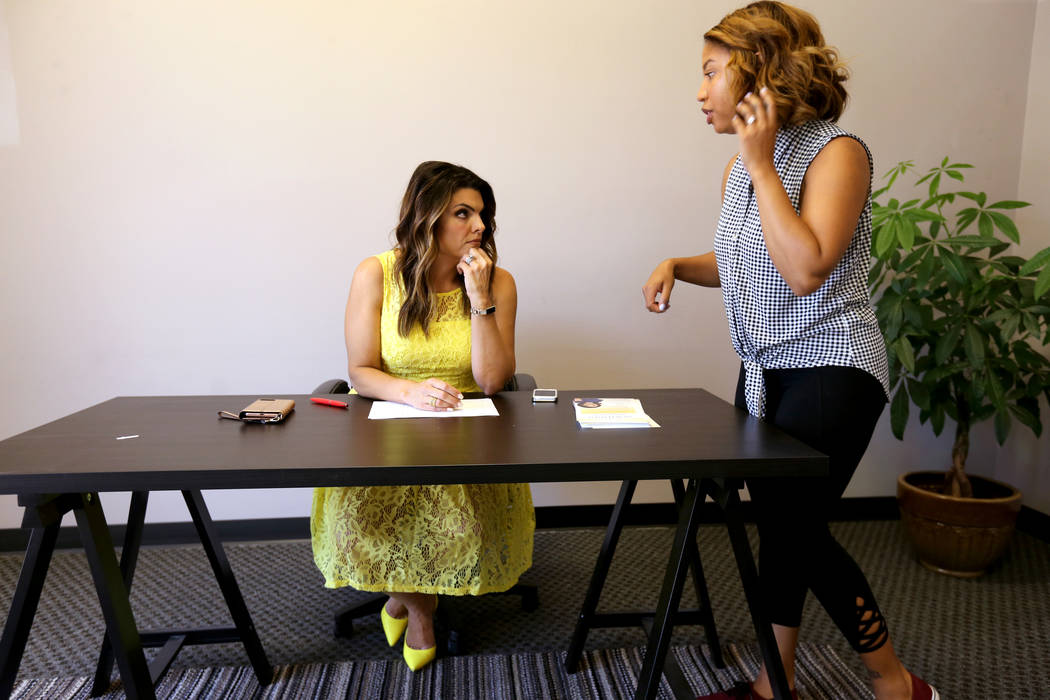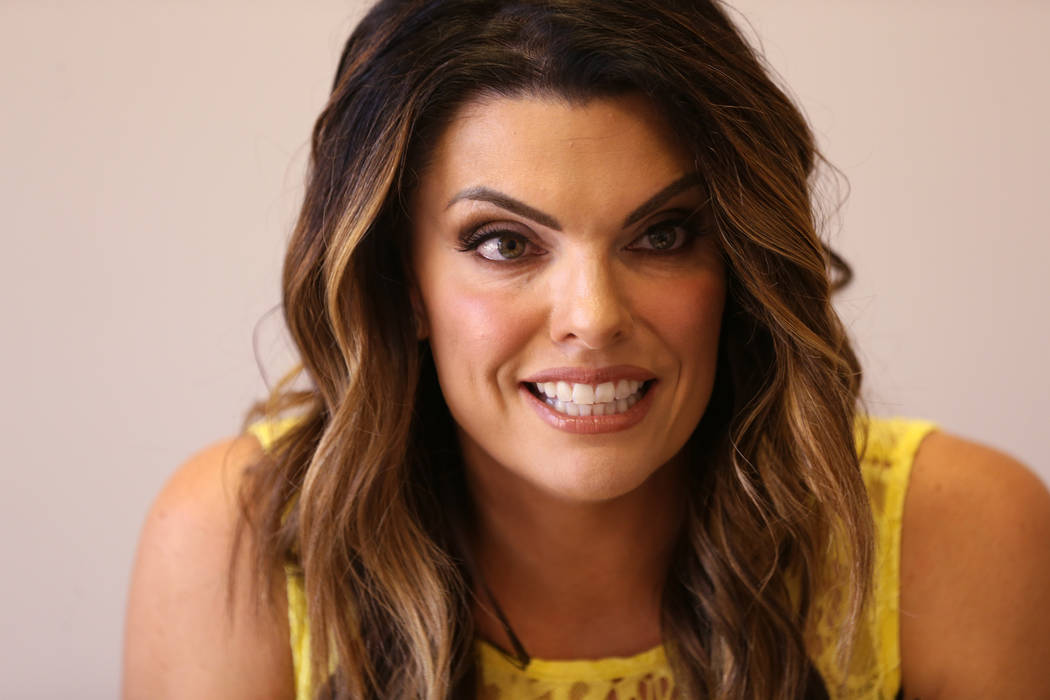Several women candidates have path to victory in Nevada
The sun’s rays were a bit hazy, thinly veiled by the clouds in the sky, and the temperature hovered near 98 degrees.
It’s no wonder the woman sporting the bright red dress and a sun hat, walking the streets of the Riviera Mobile Home Community at dinnertime caught the attention of a resident.
“My mom told me never to say (who I voted for),” 75-year-old Roberta Dina shouted from behind the screen on her living-room window. “I didn’t vote for no Republican — I can tell you that.”
Chris Giunchigliani, a Democrat candidate for Nevada governor, had been looking for Barbara, a resident of the community whom she met about three years ago.
“Let her know I stopped by, would you do that?” Giunchigliani asked.
As she walked away looking for the next registered voter, Dina revealed that Giunchigliani got her vote.
“She’s a Democrat, and she’s a woman,” she said. “A woman is not always the best. However, they’re smarter than men.”
Giunchigliani — a longtime politician and former special education teacher — is seeking the state’s highest office at a time when more and more women around the country are running for office — and winning. They have been spurred into action for myriad reasons, including resistance to the presidential administration, the “Me Too” movement, and frustration with the status quo. They’re also up and down the ballot in Nevada, representing more than 60 of the 200-plus candidates on Clark County primary ballots.
According to a Bloomberg election tracker, Tuesday night was huge for women in primary races — 92 competed in congressional primaries, and of those, 42 advanced.
Solving problems
This year, 116 women have won U.S. House or Senate primaries, 136 have lost and 269 are pending. Women also make up 56 candidates in governor races, according to the Center for American Women and Politics at Rutgers University in New Jersey.
Of the 17 candidates for Nevada governor, two are women: Giunchigliani — or “Chris G” — and Republican Stephanie Carlisle.
“I think there are a lot of women who woke up the day after (Donald) Trump got elected and said, ‘This not going to happen again,’” Giunchigliani said. “In 1990, my Democratic opponent said I belong in the kitchen, and not the statehouse. And did I prove them wrong?”
Geoffrey Skelley, associate editor of Sabato’s Crystal Ball at the University of Virginia Center for Politics, said 2018 could be similar to 1992, when Sen. Dianne Feinstein in California was among the many women elected around the country, prompting Time magazine to proclaim it the “Year of the Woman.”
“We’re seeing record numbers of women running across the board,” said Debbie Walsh, director of CAWP, adding that there are about 125 percent more Democratic women candidates and 25 percent more Republican candidates compared to two years ago.
The larger increase on the Democratic side, Skelley said, is a combination of Trump’s election, the rise of the “Me Too” movement, and the Democratic party’s makeup.
“Women tend to vote more Democratic, and men tend to vote more Republican,” Skelley said. Additionally, he said, a Pew Research study found a notable uptick in people — especially millennials — identifying as Democratic, and a decrease in those identifying as Republican.
In a crowded Congressional District 4 race, three women Democrats — state Sen. Pat Spearman, Regent Allison Stephens, and Amy Vilela — are vying for the seat being vacated by U.S. Rep. Ruben Kihuen. Skelley said Steven Horsford, who’s a known commodity and has raised a fair bit of money, might be the favorite in the race but won’t count out the others, especially Spearman.
Spearman said she experienced her own #MeToo moment in 1986, when she was in the Army serving in Panama. A colonel called her into his office, and implied he could “do a lot of things” to help her career in exchange for a sexual relationship. He later showed up at her hotel room, and she hid in the bathroom for hours.
“I felt my knees buckling,” she said. “He kept knocking, knocking.”
Spearman decided to seek a higher office with this election cycle in part because of the number of phone calls she got from women asking her to run.
“They said, ‘You have to do this,’” Spearman said. “You’re strong enough to take anything that is thrown at you. We’ll stand by you.”
Republican women are trying to run up the totem pole of politics, too, Skelley said. On the national scale, Republican Diane Black is favored in the Tennessee gubernatorial primary, and Kristi Noem just won the South Dakota GOP governor primary.
Locally, Republican Michelle Mortensen is vying to represent Nevadans in the 3rd Congressional District. She plans to shake things up.
On Tuesday morning in her campaign office, she recalled her college work with former Texas Sen. Kay Bailey Hutchison, whom she called a “pivotal female” in politics.
“I think women have always been very politically active, but they’re running for office because they want to get things done,” Mortensen said. “I think women are tired of seeing people who don’t know how to solve problems, and I think they’re rising up and saying, ‘Here am I, send me!’”
Freshman U.S. Rep. Jacky Rosen is leaving her seat to run for U.S. Senate — the only woman in the six-candidate Democratic field — and she is expected easily to win Tuesday’s primary. Rosen said she believes women are uniquely suited to solve problems because their paths in life usually aren’t linear. Women, she said, have to get on and off the career path to take care of children, or sick relatives or in-laws, and can bring those well-rounded stories to the table.
“Having more women at the table … will elevate the lives of everyone,” she said.
Waking up
But getting women to the table can be an uphill battle.
Rebecca Gill, director of the Women’s Research Institute of Nevada, and an associate professor of political science at UNLV, said the consequences for embarking on a campaign are greater for women, because of the intersection of their personal and professional lives. She said the political parties must do a better job at reducing the barriers to entry, increasing access to networks and information and actively recruiting women.
Susie Lee, who’s favored to win the Democratic primary in the 3rd Congressional District, said the day after she lost her bid for Congress in 2016 she got a call from Catherine Cortez Masto, who had just been elected to the U.S. Senate, and who told her not to give up.
“I remember saying that it would be a cold day in hell before I do that again,” Lee said.
But two years later, Washington hasn’t gotten any better, she said.
“I was motivated by the energy around Women’s March,” she said. “Women who had not been traditionally involved in politics reached out to me, asking what to do. It was empowering. If we want things to get better, we have got to get invested.”
She said it begins with how parents, teachers and mentors talk to young women, and it depends on closing the wage gap.
“It starts from the ground up,” she said.
“It’s how we start women off in their jobs, in their careers, demanding that they get equal pay and that they start off on the right foot.”
Women also need to see other women in politics and having success in those roles, said Sondra Cosgrove, president of the League of Women Voters of Southern Nevada.
Nevada is great ground for this. It ranks No. 3 in the nation for having the most women in the state Legislature, with nearly 40 percent representation.
Walsh, however, wonders if the momentum of today will continue until general election in November — and if it will be sustained into future election cycles.
“Is this going to be a one-off, or is this going to be a new paradigm?” Walsh said. “Women run when they are recruited — they don’t necessarily look in the mirror and decide ‘I can run.’ That’s been different this time around.”
Vilela knows that to be true. She remembers thinking, “Who am I?”
“I’m just somebody who’s been struggling for my whole life in poverty,” she said.
A friend told her that she’s exactly what’s needed in Congress.
“We had been told a great lie — that the average woman, or woman of color, that we don’t have a voice,” Vilela said. “We need to be standing up and take our place and have adequate representation, to tell the stories of our communities, of our children, and our loved ones.”
Contact Natalie Bruzda at nbruzda@reviewjournal.com or 702-477-3897. Follow @NatalieBruzda on Twitter.



